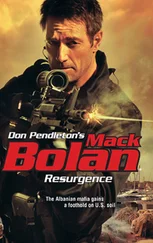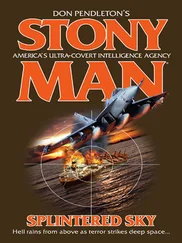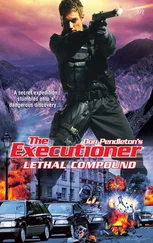The loss of the night air and the horizon line combined with the rocking of the boat caused Yasim’s stomach to roll. It was the primary reason he hadn’t been chosen to retrieve this merchandise from halfway around the world. He’d have never made it that long on board a ship and Sayid Rais Sayf believed that getting the uranium into the country was best accomplished by sea through Canada and into the United States.
To the naked eye, the main cabin of the yacht was nothing more remarkable than a well-furnished pleasure vessel, capable of long journeys. A kitchen, a galley, a table and benches that formed a U-shape in the corner. A short passage led to the sleeping quarters and a lavatory. Yusef walked to the table, unlocked the pins from underneath and revealed that it was actually a wooden top sitting on a large metal crate.
The container itself glowed faintly from the light of an electronic keypad on one side. Yasim moved forward, watching carefully as Yusef punched in a combination. The electronic locks popped open and he lifted the lid to reveal the long, slender rods of enriched uranium that he’d purchased for them in Iran. The box itself was refrigerated for safety, and the mist from inside floated around, giving an ethereal appearance to the deadly substance.
“You see, my friend? Everything is as I said it would be. There is nothing to cause you alarm.” Yusef closed the container and punched in the code to lock down the lid.
“And the code?”
“Ah, the only six numbers I knew we would all remember. The years of our prophet’s birth and death: five-seven-zero-six-three-two. Simple enough, yes?”
Trying to ignore the faint roiling in his guts, Yasim nodded. “Simple enough.”
“Then, as I can see that you are already—what is the saying?—green around the gills, let us return to deck and finish our transaction. I am certain that Sayid must be anxious to have you safely back in port.” He lowered the tabletop and replaced the pins. “Shall we?”
“There is one other matter that I must discuss with you first,” Yasim said. “Privately.”
“What is that?” Yusef asked, his eyes going a little white around the edges.
“While we were waiting for you to deliver the merchandise, word reached us that you spoke to the Libyans about selling them these rods instead of us.”
Yusef sputtered, his face turning red before he finally answered. “I... Astaghfirullah! I will not insult you by lying, Malick, and I am truly sorry, but I am a businessman and I thought I might make a greater profit by selling the rods to one of my contacts in Libya.”
Moving like a striking snake, Yasim whipped a thin-bladed knife from his belt, grabbed Yusef by the collar and forced him back against the bench. “It was our men who sacrificed to get you this cargo. Our blood that was spilled. Our money that was spent.” He spat on the ground. “Subhan’Allah! If you were truly a believer you would not be seeking profit. You would give us the rods willingly, for our holy cause.”
“Malick...you are right, I will ask for no profit. I will give this happily for the cause.”
“You have no cause but yourself. Did you tell anyone else where you were delivering the rods? Or perhaps you told the rival who they were bidding against?”
“No! No, I swear. I only explored the option, but I knew that this is where Allah wanted the shipment to go.”
“You should have known that all along.” Yasim’s blade sank into Yusef’s throat, puncturing his larynx. The man thrashed and struggled beneath Yasim’s grip briefly, but only briefly. He slumped to the floor and Malick offered a grim smile to the body. That would be the end of Yusef’s whining and groveling. He was in Hell where he belonged, his passage to Heaven denied by his own traitorous actions.
He wiped his blade clean, then climbed back up on deck. The two crew members who served Yusef were dead on the deck. He nodded in satisfaction to his team. “Let us finish this work and get back on land. My stomach does not tolerate this well. If I never step foot on a boat again it will be too soon.”
One of the men muttered a short prayer under his breath as they moved to unload the heavy crate from the yacht. Yasim prayed, too. He prayed that Allah would be with them as Sayid’s plan was put in motion and that thousands of Americans would die because of his efforts.
This was their jihad, their struggle. Justice would be visited upon them for all the wrongs done to their people by the Americans.
1
Denny Seles, the Special Agent in Charge of the Detroit Field Office of the Federal Bureau of Investigation sat in his black SUV for a moment, watching the scene. He was pushing forty, and while he’d long since gotten used to the middle-of-the-night phone calls that were part of his job, they didn’t usually come from the Coast Guard. More often than not, it was one of his field agents calling about a body. The flashing lights of an ambulance, along with two police cars, a fire truck and two other unmarked vehicles lit up the night. He flicked the Detroit Lions air freshener hanging from his rearview mirror, a superstitious habit he’d picked up along the way, and stepped out of the SUV.
Faintly, over the sound of voices and vehicles, he could hear the lapping of the waves of Lake St. Clair. He guessed that the large, white yacht grounded on the beach was the source of the call he’d received less than half an hour before.
“You must be Special Agent Seles?” a man said, stepping out of the crowd and extending a hand.
At six foot one, Denny wasn’t considered small, but the man standing before him had him by a good three inches. He was tall and lanky, but offered a tired smile.
“Yeah, that’s me,” he said. “Special Agent in Charge, Denny Seles.”
“Chief Richard Cline, sir,” he said, and they shook hands. “When the local guys told me your office had jurisdiction, your name and number were what they gave us. So you’ll be taking over this mess?”
“If the local guys are right about jurisdiction, then yeah. Tell me what you got.”
“A local fisherman called us in with a report of a boat run aground. We dispatched both a boat and a ground crew to the coordinates. Our ground crew got to the vessel first and backed out to wait for law enforcement as soon as they’d verified that everyone aboard was dead.”
“You logged the caller’s information?” Seles asked.
Cline nodded. “It will be in my written report, which will be on your desk by 0800.”
“Good,” Seles said. “Tell me what your ground crew found inside the boat.”
“You’ve got three dead—two with bullet wounds to the head, one with a knife wound to the throat. But I think the important information, sir, is that this isn’t an ordinary yacht.”
His tone caught Seles’s attention. “What do you mean?”
“I mean this isn’t a lake cruiser. This ship has been modified to sail the high seas, complete with an extendable mast system and sails. She came from deeper waters than Lake St. Clair.”
“A lot of ships in the Great Lakes are modified or even built to sail on the ocean. How do you know this one actually came from somewhere else?” the agent asked.
Cline chuckled. “I’m not guessing, sir. We ran the numbers on the hull. This boat was logged in the Mediterranean Sea three months ago and docked in Gibraltar around that time. All the permits for a non-commercial ocean crossing were found aboard.”
“Interesting,” he said. “You know anything else?”
“One last thing, sir. Beneath the table in the galley was a hidden, refrigerated compartment. It was empty, and when the local guys gave me the go-ahead on federal jurisdiction, I went ahead and ordered our forensic team to come in and do a full sweep.”
Читать дальше












